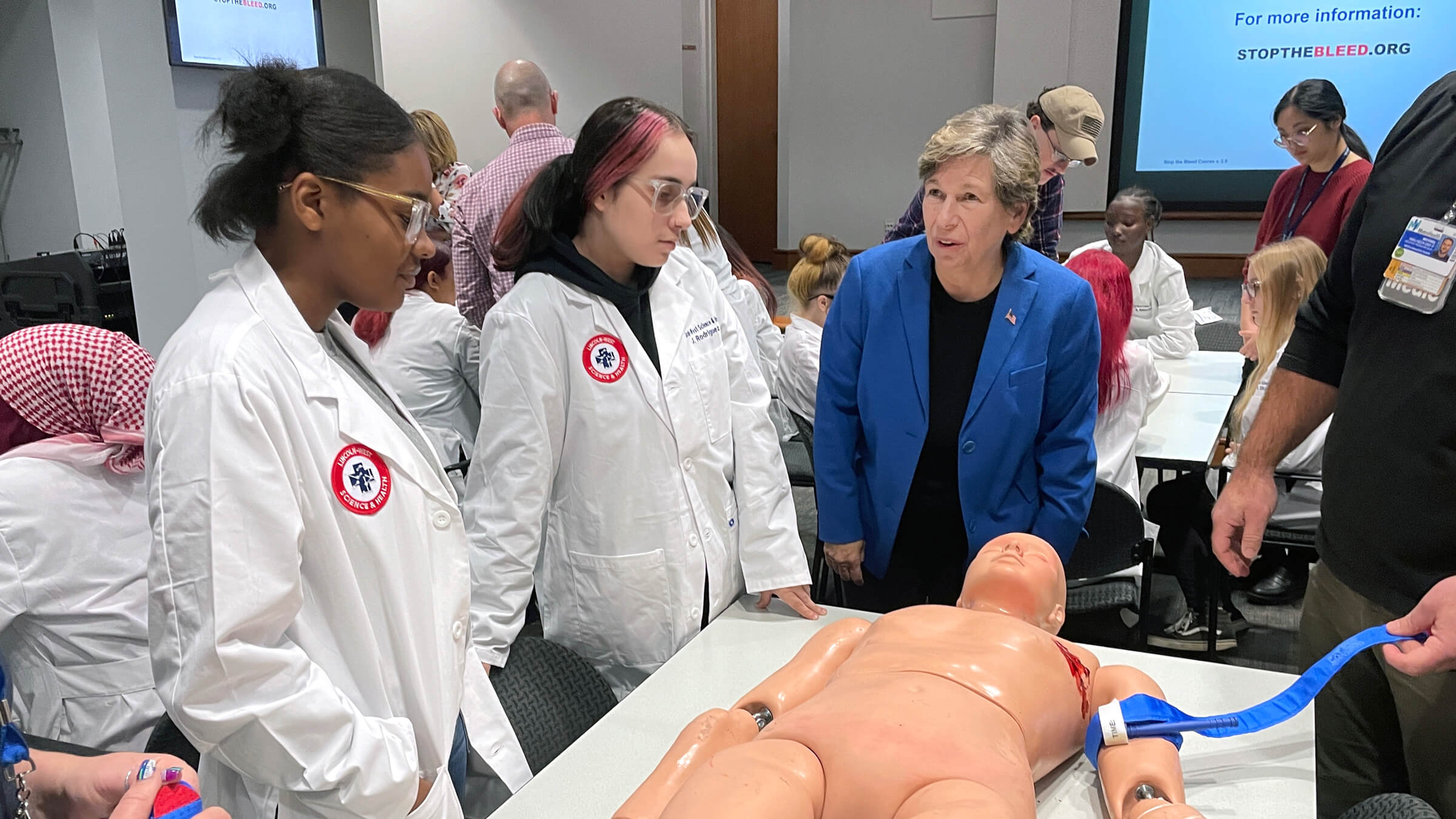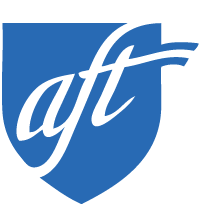A vote for welcoming, well-rounded public schools
Voters rejected extremist politicians and school board candidates running on culture-war agendas grounded in divisiveness and fear.

Weingarten, right, with students at Lincoln-West School of Science and Health at MetroHealth hospital in Cleveland on Oct. 24. Photo by Alex Palombo
We are in a time of high anxiety, and perhaps no one feels that more acutely than children and families. Gun violence, social media, COVID-19, economic concerns, political and cultural divisiveness, and so much more, all fuel worries about our young people’s well-being. Over the last few years, extremists have sought to exploit parents’ anxiety to advance their political and ideological agendas. But voters in last week’s elections across the country rejected extremist politicians and school board candidates running on culture-war agendas grounded in divisiveness, fear and smears. Majorities of mainstream parents instead supported candidates who champion public schools that are safe and supportive for all students and that provide a robust curriculum and the resources needed to help young people recover and thrive.
The results underline what families have been telling us for the last two years: Families want their kids to get a well-rounded education, develop strong fundamental academic and life skills, and have pathways to career, college and beyond. They, like teachers, want a voice in their kids’ education, but that doesn’t mean banning books or censoring curriculum. So, when extremists peddled fear or tried to smear and divide, they lost voters’ support.
When public education was on the ballot, public education won. An AFT analysis of approximately 250 races where the far right backed anti-public education candidates found AFT-supported candidates won over 80 percent of the time. Anti-public education candidates publicly supported by Moms for Liberty and the 1776 Project PAC lost 75 percent of the time.
This did not surprise me. I am in schools across the country all the time, and if you follow me on social media, you know I am constantly talking with students, educators, parents and community members. They want strong, supported public schools. They don’t want students to be marginalized. They don’t want strangers to dictate what books other people’s children can and cannot read. They want young people to be able to discuss complex issues and bridge differences. They want students to have access to tools and curriculum that address the challenges of today and that prepare them for the opportunities of today and tomorrow.
That’s the goal of the AFT’s Real Solutions for Kids and Communities campaign, which aims to tackle learning loss, loneliness and literacy challenges. Our campaign focuses on key strategies to create joyful and confident readers; care for young people’s mental health; expand community schools; engage students in their learning through hands-on experiences, including career and technical education; and secure investments public schools need—for improved teaching and learning conditions, adequate staffing, fair pay for teachers and school staff, and other fundamentals for a high-quality education in every school.
In recent weeks alone, I’ve seen so many examples of this, including students’ deep engagement at two public schools in Yonkers. Students at Saunders Trades and Technical High School can get hands-on experience in fields as far-ranging as architecture, biochemistry, auto mechanics and cosmetology. At Yonkers’ Roosevelt High School, students can earn college credit while still in high school; a recent valedictorian graduated with 72 hours of college credit. I also visited Lincoln-West School of Science and Health in Cleveland, which is located in a hospital so students can get valuable immersive experiences leading to in-demand careers. In Beaverton, Ore., I saw a fantastic literacy program and the many ways school staff are providing social and emotional supports for students. And, in one weekend alone, the AFT gave kids and families 120,000 free books, through the AFT Reading Opens the World program, at book fairs in Houston, Queens and Webster, N.Y. (The AFT and First Book have given away more than 9 million great, diverse books—and counting.)
Contrast any of these programs for young people with the extremists who work so hard to divide people and undermine public schools but offer nothing to help students develop the skills and knowledge they need to succeed in life.
These election results should be enough to retire the myth that entities like Moms for Liberty, which the Southern Poverty Law Center includes on its list of extremist groups, represent the majority of this country’s parents. AFT members and our partners in groups like MomsRising, ParentsTogether, Red Wine & Blue, and the Campaign for Our Shared Future represent tens of millions of Americans. We want to strengthen, not diminish, public education.
Is there work we have to do? You bet. Do teachers and support staff want to do that work? Of course. We will continue to work with parents to help all our children get the well-rounded education they deserve in the safe, welcoming and supportive environments children need.
A message from our Publisher & CEO Rachel Fishman Feddersen

I hope you appreciated this article. Before you go, I’d like to ask you to please support the Forward’s award-winning, nonprofit journalism during this critical time.
We’ve set a goal to raise $260,000 by December 31. That’s an ambitious goal, but one that will give us the resources we need to invest in the high quality news, opinion, analysis and cultural coverage that isn’t available anywhere else.
If you feel inspired to make an impact, now is the time to give something back. Join us as a member at your most generous level.
— Rachel Fishman Feddersen, Publisher and CEO















